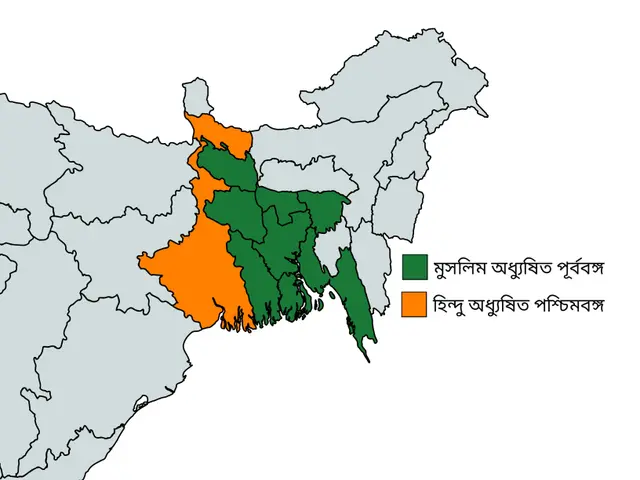The Surge of Anti-LGBTQ+ Sentiments: A Stepping Stone for the Far-Right
"Minorities are initially targeted, but eventually affect everyone equally"
In a shocking turn of events, the vibrant Pride celebrations that adorn German cities each May are being met with a dark undercurrent. As the world marks the International Day Against Homophobia, Biphobia, Interphobia, and Transphobia (IDAHOBIT) on May 17, political scientist and author Michael Hunklinger raises an alarming concern: a steep increase in attacks against the LGBTQ+ community, accompanied by decreased support for events like the Christopher Street Day (CSD).
As some cities in Germany, such as Cologne and Berlin, face a decline in sponsorship for their CSD parades, the finger points towards the US, as President Trump's anti-wokeness campaign stirs anti-LGBTQ+ sentiments globally. US companies have withdrawn their support for CSD parades, and German companies are finding themselves on the receiving end of pressure to scale back their diversity programs.
This shift is not just a superficial one. Hatred and intolerance towards the LGBTQ+ community are on the rise in Germany. Last year, the CSD in Bautzen, Saxony, was marred by right-wing extremist protests, necessitating precautions for attendees' safety. The Bueno Aires CSD in Argentina is another recent example, where a Catholic organization attempted to obstruct the parade, sparking widespread condemnation [1][2].
Statistics from the Baden-Württemberg Ministry of the Interior reveal a disturbing trend. Hate crimes based on sexual orientation or gender identity in 2024 increased by almost 30% from the previous year, with a significant rise in crimes targeting transgender or non-binary individuals. The BKA reports that across Germany, over one in ten hate crimes in 2023 were directed at the LGBTQ+ community.
The Far-Right's Strategy of "Hinge Ideologies"
Gabriel Nox Koenig, from the Federal Association Trans*, explains that transphobic and queerphobic sentiments function as a "hinge ideology" in the increasing mobilization of the far-right. These sentiments provide a bridge for radical ideologies, enabling them to gain access to people in mainstream society. Right-wing extremists can capitalize on the fears and prejudices that perspective individuals may harbor against the LGBTQ+ community, using this foundation to disseminate other extreme narratives such as those regarding migrants and purported dangers.
Donald Trump's anti-LGBTQ+ policies, such as banning gender-neutral passports and expelling trans people from the US military, offer a blueprint for the rise of anti-LGBTQ+ sentiment worldwide [3]. The far-right's ultimate goal is not merely the abolition of same-sex marriage or mass deportations; their ultimate objective is to erode democratic fundamental rights, putting us all at risk.
It's crucial to remember that the struggle against discrimination and intolerance affects us all. History has shown us that when one group can be oppressed, others can follow. Hunklinger warns, "Just because some people aren't affected yet doesn't mean they won't be in ten years. It starts with the minorities, but it ends in the middle of society."
Building Bridges and United Fronts
Cultivating spaces of acceptance and advocating for the rights of LGBTQ+ individuals is essential to counteract the far-right's agenda. This includes standing up against discriminatory remarks and promoting a culture of inclusivity in our homes, workplaces, and circles of friendship. Hunklinger suggests asking oneself, "Can I marry who I want? Can I work where I want? Can I move in public spaces as I want?" If the answer is yes, it's essential to consider what would happen if these fundamental rights no longer existed.
In the face of growing far-right mobilization and the erosion of democratic values, it's crucial not to give up hope. Resistance can take many forms, whether in political organizations, political parties, unions, or social media platforms. United, we can stand against the division of society and uphold the principles of unity and equality that democracy requires.
In a time where transphobic and queerphobic sentiments threaten our social fabric, it's crucial to come together, focusing on our shared values and similarities rather than our differences. By fostering a culture of understanding and acceptance, we can counteract the dangers posed by the far-right and pave the way for a more inclusive and equitable society for all.
- LGBTQ+ rights
- Democracy
- Human rights
- Transphobia
- Right-wing extremism
- Far-right ideologies
- Germany
- Political repression
- Discrimination
- Donald Trump
- USA
Enrichment Data:
The increase in transphobic and queerphobic sentiments in Germany may be understood through the lens of "hinge ideologies." This concept refers to how certain ideologies or sentiments can serve as a bridge or hinge, allowing extremist groups to transition from the fringes to the mainstream. Here's how the far-right might use these sentiments:
Understanding the Hinge Ideology Concept
Hinge ideologies are beliefs or attitudes that can be used by extremist groups to connect with mainstream society. These ideologies often tap into existing fears or prejudices, making them more palatable to a broader audience. In the context of transphobic and queerphobic sentiments, these ideologies can be leveraged to create a platform that appears to address social concerns while masking more radical agendas.
Historical Context
In Germany, historical events have shown how attacks on marginalized groups can be used to galvanize support for extremist ideologies. For example, the Nazi regime's actions against LGBTQ+ individuals, such as the raid by the German Student Union on May 6, 1933, and the rewriting of Paragraph 175 to prohibit male homosexual contact, demonstrate how targeting sexual minorities can be used to consolidate power and create a narrative of moral purity[1][2].
Contemporary Far-Right Strategies
- Social Media and Traditional Media: The far-right often uses social media platforms to spread misinformation and fuel fears about gender identity and sexual orientation. By creating a narrative that LGBTQ+ rights are a threat to traditional values, they can gain traction among conservative or undecided voters.
- Political Rhetoric: Politicians from far-right parties often employ rhetoric that subtly or overtly targets LGBTQ+ individuals, framing their policies as necessary to protect traditional family values or national identity. This rhetoric can be designed to appeal to a broader audience by positioning themselves as defenders of cultural norms.
- Coalition Building: Far-right groups may form alliances with other conservative or religious groups to amplify their message. By framing their agenda as part of a broader cultural or moral struggle, they can gain support from those who might otherwise be skeptical of their extreme views.
- Exploiting Divisions: The far-right exploits existing social divisions, using transphobic and queerphobic sentiments to create a wedge between different segments of society. By framing LGBTQ+ issues as contentious, they can create a perceived crisis that requires their unique brand of solutions.
Conclusion
The far-right in Germany uses transphobic and queerphobic sentiments as a hinge ideology by exploiting existing prejudices, creating a narrative that aligns with perceived mainstream values, and leveraging these sentiments to gain broader acceptance and legitimacy. This strategy allows them to transition from fringe ideologies to more mainstream political discourse, often by masking their more extreme views beneath a veneer of cultural or moral concern.
- Community policy should address the rise in attacks against the LGBTQ+ community, ensuring the safety and rights of all citizens.
- Employment policy needs to promote inclusivity and prohibit discrimination based on sexual orientation and gender identity.
- The fashion-and-beauty industry should strive to represent the diverse array of individuals within the LGBTQ+ community.
- Books that promote understanding, acceptance, and inclusion of LGBTQ+ individuals need to be accessible to readers of all ages.
- Migration policies must ensure the safety and protection of LGBTQ+ individuals seeking asylum.
- Education-and-self-development programs should include comprehensive sexuality education, promoting understanding and acceptance of all orientations and identities.
- Personal-growth courses should foster a culture of empathy and understanding towards the LGBTQ+ community.
- Mindfulness practices can help individuals let go of prejudices and ultimately foster a more accepting society.
- Engaging in responsible gambling can help fund charities that support LGBTQ+ organizations and contribute to a more inclusive society.
- Legal reforms are needed to combat the disproportionate number of hate crimes against the LGBTQ+ community.
- Employment policy can be an essential tool in ensuring equal opportunities for LGBTQ+ individuals in various industries, such as casino-and-gambling and casino-culture.
- Celebrities and entertainment figures can use their platforms to advocate for LGBTQ+ rights and raise awareness about the issues facing the community.
- Casino-personalities can contribute to LGBTQ+ charities and initiatives, promoting a more inclusive casino environment.
- Online-education platforms should provide courses on LGBTQ+ history, culture, and issues to help foster understanding and acceptance.
- Job-search resources should cater to the specific needs of LGBTQ+ individuals, including resources for finding LGBTQ+-friendly employers.
- Poker and casino-games offer entertainment and a sense of community for people of all identities.
- Slots and lotteries can provide a form of leisure for the LGBTQ+ community, with proceeds supporting LGBTQ+ charities.
- Las Vegas, a city known for its casino-culture, should aim to be more inclusive and welcoming to the LGBTQ+ community.
- Understanding the history of Las Vegas can provide insight into its transformation into a cultural hub for various communities, including the LGBTQ+ community.
- Las Vegas myths and legends often underscore the city's inclusivity and open-mindedness, embodying the spirit of acceptance and fun.
- Gambling trends in the LGBTQ+ community can reveal preferences and interests, potentially informing marketing and service strategies in the casino industry.
- Learning about the lives and achievements of influential casino personalities can inspire LGBTQ+ individuals to pursue their dreams and make their mark in the industry.
- Setting personal goals related to career-development, personal-growth, and social activism can help individuals make a positive impact in the LGBTQ+ community.
- Refusing to accept discrimination and intolerance in any form is essential for building a more inclusive and equitable society.
- Politics plays a significant role in shaping policies that affect the rights, safety, and opportunities of the LGBTQ+ community.
- Embracing lifelong learning and skills-training can help equip individuals with the knowledge and abilities to counteract the far-right's agenda.
- Sports culture, including soccer, football, basketball, and other popular sports, should be inclusive and welcoming to individuals of all sexual orientations and gender identities.
- Championing sports organizations and athletes who openly support LGBTQ+ rights can help foster a more accepting sports culture.
- Advocating for progressive policies that address issues such as marriage equality, non-discrimination laws, and inclusive education can help create a more inclusive and equitable society for all.








